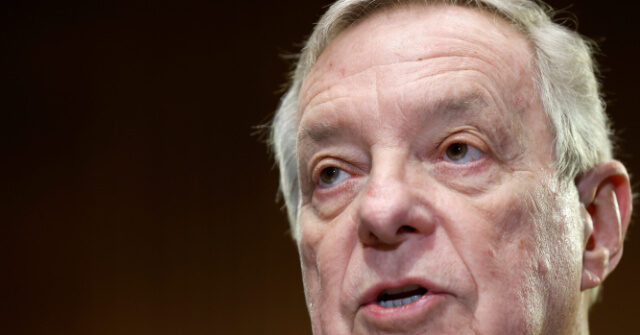The Electronic Payments Coalition (EPC) is set to launch a nationwide advertising campaign targeting Senator Dick Durbin of Illinois, labeling him as a significant opposition figure against President-elect Donald Trump. This initiative comes as a response to Durbin’s support for a legislative measure that, according to EPC, favors large corporations at the expense of the benefits American workers typically gain from rewards and other incentives associated with credit cards.
The advertisement, which is slated to air on Inauguration Day, criticizes Senator Durbin by calling him “Donald Trump’s number one enemy in Congress.” It accuses him of backing a plan that allegedly aims for “a government takeover of your credit card.”
Give Me News Podcast
The ad emphasizes that consumers currently have a wide range of choices in credit cards, all offering robust security. However, it claims that Durbin’s proposal would lead to reduced competition and security, thereby increasing the risks to consumers’ credit and identity protection. The ad urges Republicans in Congress to intervene and prevent what it terms as “Durbin’s takeover” before it’s too late.
Senator Durbin is a long-standing Democrat known for his opposition to several key initiatives and appointments during the Trump administration. He voted against the confirmations of Supreme Court Justices Brett Kavanaugh, Neil Gorsuch, and Amy Coney Barrett. Additionally, he opposed the 2017 tax cut bill and supported Trump’s conviction in both Senate impeachment trials.
Further reflecting his stance against Trump, Durbin voiced his opposition to Trump’s nominees for key positions, including Pam Bondi for attorney general and Kash Patel for FBI director. Durbin expressed concerns over the qualifications and motivations behind these nominations, asserting that the President-elect aims to replace his own appointees with individuals who exhibit unwavering loyalty. He urged the Senate to reject such efforts, which he described as unprecedented attempts to politicize the FBI for Trump’s alleged campaign of retribution.
Richard Hunt, the Executive Chairman of the EPC, conveyed to Breitbart News that Durbin’s bill poses significant challenges for American workers. He argued that the proposed changes could have detrimental effects on small businesses while compromising fraud protections and data security. Hunt suggested that the primary beneficiaries of such changes would be large corporate entities and some of Durbin’s prominent donors, who stand to profit more from the legislation.
Hunt also pointed out that similar government interventions in the credit card industry have been attempted in the European Union, resulting in negative outcomes. He urged Congress to avoid adopting economic policies modeled after European practices, which he believes have proven ineffective.
The EPC, which includes major financial entities like Visa and Chase among its members, has reportedly contributed $1 million to the advertising campaign. This financial backing underscores the coalition’s commitment to opposing the legislative measure supported by Senator Durbin.
Wendell Husebo, the political reporter for Breitbart News, covered this story. Husebo is a former analyst from the Republican National Committee’s War Room and has authored the book “Politics of Slave Morality.” He actively shares his insights on various social media platforms, including “X” and Truth Social.
Through this advertisement campaign, the EPC aims to raise awareness about the potential implications of Durbin’s legislative support. Their focus is on how it could affect consumer choice and security within the credit card industry. The coalition’s efforts highlight the ongoing debate over the role of government regulation in financial markets and the balance between consumer protection and corporate interests.
In addition to the direct criticisms of Senator Durbin, the advertisement and accompanying statements from the EPC reflect broader concerns about legislative measures that may alter the landscape of the credit card industry. The coalition’s stance suggests a preference for maintaining the current level of competition and security that consumers experience with their credit card options.
As the ad campaign unfolds, it is likely to contribute to the ongoing discourse surrounding financial regulations and the impact of government intervention on both businesses and consumers. The EPC’s efforts to influence public opinion and legislative actions underscore the complexities involved in shaping economic policy and the diverse perspectives that inform these debates.
The timing of the advertisement, coinciding with Inauguration Day, adds a strategic element to the campaign, aiming to capture the attention of both policymakers and the general public during a period of heightened political activity.
By positioning Senator Durbin as a central figure in this issue, the EPC seeks to galvanize opposition to the legislative measures he supports, while advocating for policies that align with their vision of a competitive and secure credit card market.
Overall, the EPC’s advertising campaign against Senator Durbin reflects a significant effort to influence the conversation around credit card regulation and the broader implications for consumers and businesses alike. The coalition’s actions illustrate the intersection of politics, economics, and consumer advocacy in shaping the future of the financial industry.



Durban,an old Communist posing as a Democrat.Very vile individual,typical America hating individual suffering from a lethal TDS
GET THE NOOSES READY, A LOT OF THEM,